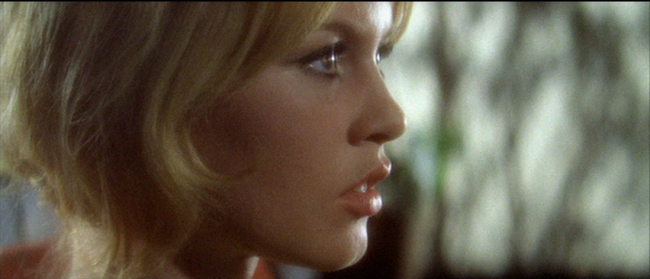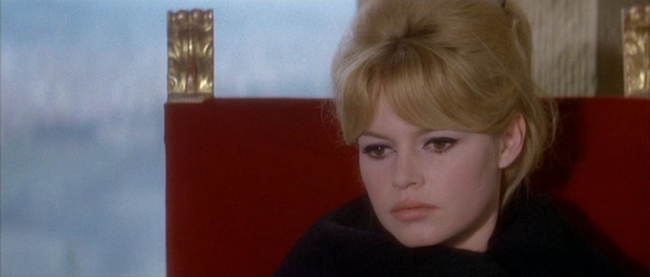
There are many ways to frame culture wars; liberal versus conservative, change versus stability, innovation versus tradition. Partisans have trouble admitting that generally we need some compromise between the two so maybe that's where the Romantic Comedy can help. 1962's Love on a Pillow (Le repos du guerrier) uses the familiar pairing of a lower class guy and a upper class gal to comment on the cultural conflicts of the 50s and 60s. It's no masterpiece but it is an entertaining and thoughtful film directed by Roger Vadim and based on a novel by feminist author Christiane Rochefort.

A wealthy heiress, Genevieve (Brigitte Bardot), checks into a hotel in Dijon and accidentally enters the wrong room where she discovers a man named Renaud (Robert Hossein) unconscious in bed from an intentional overdose of sleeping pills. She calls for help and his life is saved by her fortuitous accident.

She has a fiance back in Paris but the Florence Nightingale syndrome kicks in when she has lunch with Renaud after he's released from the hospital. So she takes him home to her recently inherited sumptuous manor. Like many Brigitte Bardot movies, a lot of the plot revolves around her being naked and she and Renaud first make love after he walks in on her nude, gazing into her massive fireplace.

"Make love" might not be the right expression because the film's central conflict is over the difference between love and sexual attraction and whether the former even truly exists. Genevieve is shocked by Renaud's bohemian lifestyle yet can't help following his advice when it comes to blowing off her commitments. She also breaks up with her fiance because she insists she loves Renaud but Renaud insists the two of them have an open relationship because he thinks love as a concept is just part of the bourgeois tyranny that stifles natural human sexual urges.

Because the first half of the movie is apparently about him opening her eyes to life's realities, and her feelings of liberation as a result, she doesn't seem to have a leg to stand on to argue in favour of anything so stodgy as monogamy. He's something of a beatnik and takes her to meet his friends, the typical movie beatnik assemblage of hazy poets, scattered jazz musicians, and girls with slightly dishevelled hair. Both Renaud and Genevieve flirt with other people but they also keep watching each other.

There are problems that become apparent in Renaud's philosophy, if the fact that he was trying to commit suicide wasn't already an indication. He can't commit creatively, for one thing, and Genevieve discovers the book he's been working on is just the same first sentence over and over, like the writer in Camus' The Plague. As Renaud's outlook on life is gradually revealed to be less and less adequate to suit his emotional needs, Genevieve tells his father that she feels a strange peace, commenting, "It's like giving birth. Like I now have the strength to live for myself . . . " At the same time, she also says, "I feel like I understand him now."

What had been presented as a conflicted between the Beat and the Old Money is really a conflict about power and freedom. When he was rocking her world, he had the power and freedom, and then when she has the upper hand, the power and freedom is hers, and now she can look back and understand how he felt when he had her at a disadvantage. Naturally, this calls into question the wisdom of subscribing to either philosophy wholesale and she seems to know it.
It's a nice looking movie and the performances are good though Bardot has a tantrum at one point that seems a bit forced, as though she told Vadim she wanted to do the scene in Citizen Kane where Kane smashes up Susan's room but the story here doesn't quite justify it. Of course, she looks terrific.
Twitter Sonnet #1149
The winking waves report in frothy lids.
A crowded grin replete with eyes appeared.
In razor slats the apple fell to bids.
The table took the chips for something weird.
The pair repaired beneath an absent roof.
A weakened pull divests a world of moons.
At craggy hill the place entraps a hoof.
For flocking dreams the tired walker swoons.
Collected chairs established last the screen.
Contained between the leather arms they sat.
In lavender and coffee friends've made the scene.
The books returned the fertile brain of Cat.
A cast assembles parties off the sheet.
Instead of cake they sliced neglected peat.

No comments:
Post a Comment